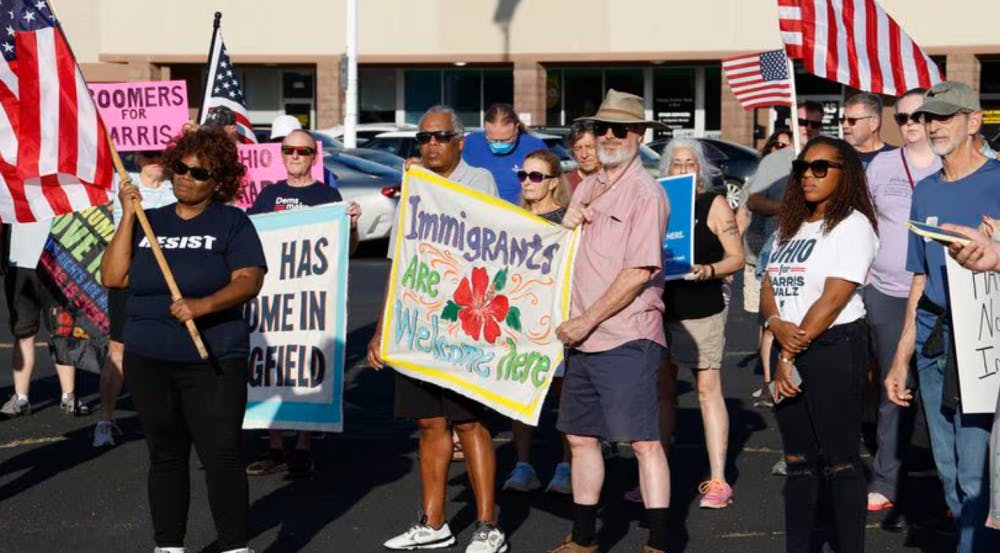Political turmoil and Immigrant Safety | Photo by Bill Lackey
As another presidential election season approaches, the nation and Wright State University navigates how to endure the heavily-divided time of year.
Political divide and public safety
On Sept. 10, Vice President Kamala Harris and former President Donald Trump participated in a debate that was unfortuitous for more than just one reason.
Trump’s claims of Haitian immigrants in Springfield, OH eating pets has resulted in upsurges in discrimination in the area, as well as concerns for immigrant safety. Springfield has received bomb threats since the false claim, leaving residents fearful.
Many officials have had to make statements regarding the validity of Trump’s claim, which has gained local and national attention.
“I want the people of Springfield and Clark County to know that as we move forward, we will continue to do everything we can to help the community deal with this surge of migrants,” said Ohio Governor Mike Dewine.

Dewine also announced $2.5 million would be given to the town of Springfield to expand primary care access to residents.
Immigrant discrimination and safety has become an issue in Springfield’s surrounding areas. Dayton, an immigrant-friendly city, is also dealing with the backlash of Haitian immigrant allegations.
"We stand by our immigrant community and there is no evidence to even remotely suggest that any group, including our immigrant community, is engaged in eating pets,” said Dayton Police in a statement.
Dayton has made efforts to support immigrant residents for years now. In 2017, Dayton became the first Certified Welcoming City in the US.
Welcoming America is a nonprofit that connects with local governments to advocate for inclusiveness in communities.
In regards to the turmoil experienced in Dayton and Springfield, Welcoming America stated,
“Cities like Dayton, Ohio; Lancaster, Pennsylvania; and Tulsa, Oklahoma, demonstrate how a commitment to leading through demographic change — marked by a welcoming spirit and policies that eliminate barriers to participation and foster intergroup dialogue — can lead to resilience and success.”
This presidential race, the nation has seen much violence and disagreement on big issues, like abortion, causing a great division of both parties and strong opinions of each candidate. The upsurge in political turmoil is expected with each presidential election season, but seems to be amplified in recent elections.
2024 presidential election compared to past years
In recent years of political elections, the public has witnessed a shift in a once good-mannered nature between politicians to a great disrespect of each other and idolization from voters.
Lee Hannah, a political science professor at WSU, credits this shift to a number of factors including the candidates running, media portrayal and a heavy correlation between political party and morals.
“I think some of the issues that we’re currently arguing over brings everyone in. It's the school curriculum, it’s transgender rights, these issues affect the collective,” said Hannah.
The 2024 election is tackling big moral issues, which has added to the divide between the republican and democratic parties, but a strong devotion to candidates from voters is fueling the fire.
“It does seem like it follows Trump more than anything else, right?” said Hannah, regarding the conflict between parties.
Americans’ resonation with political issues and personal morals is a factor that is unavoidable during any election, but is heightened this year.
Much of voters’ morals being brought to the table this year in issues including abortion, sexuality, gender and more, can lead to anger and violence.
Many voters are plagued with exhaustion and burnout during election season, causing individuals to become desensitized to important news and events.
This year, two unsuccessful attempts at assassination were tried, yet the second attempt gained little positive attention from the media towards the former president.
“A look at the first 72 hours of coverage on the ABC, CBS and NBC evening newscasts– Sunday, Monday and Tuesday nights– finds that while the attempted assassination dominated campaign coverage, these networks’ anti-Trump spin was nearly as bad as it could be: 95% negative, vs. just five percent positive,” stated the Medican Research Center’s report.
Negative press towards Trump signals the exhaustion that many voters face during election season and a demand for professionalism in political media once again.
“There is evidence that there are a lot of programs that run fairly effectively that aren’t at the center of political and cultural wars…But the problem is that it’s presented to us as a drama or a soap opera of personalities,” said Hannah.
Hannah explained that policy simply is not interesting to most people. Policies can be difficult to follow, so the public often gravitates to coverage that points certain candidates in an overly negative or positive light. Hannah advocated the need for a more responsible news media.
This overwhelming amount of information being directed towards the American public often leads to exhaustion and a desensitized mentality towards election news.
“I definitely think there is some apathy setting in, because it is tiring,” said Hannah, regarding burnout.
Election seasons are a stressful time of year. With increased violence, pressure placed on voters to consume overwhelming amounts of media and stress of public division, Americans need professionalism back in politics to lessen these issues.












